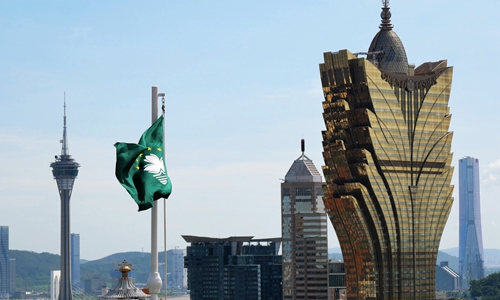HOME >> OPINION
‘One country, two systems’ principle helps Macao soar
Source:Global Times Published: 2019/12/5 23:18:40

Photo: VCG
On December 20, Macao will mark the 20th anniversary of its return to China. Various celebrations are being organized to fete the return of the city to its motherland. Under the "one country, two systems" principle, Macao has made remarkable economic, cultural and social achievements. Looking back, the success of "one country, two systems" principle in the city relies on the efforts of Macao itself and support from the Chinese central government.The city administration has tried hard to improve people's livelihood with adequate infrastructure like housing, healthcare, transport and so on. It has also often recorded fiscal surplus during the development.
In addition, Macao has been promoting a more comprehensive education than that of Hong Kong. The government not only focuses on the optimization of the education system, quality improvement, and promotion of equality, but also encourages patriotic education, which passes on the spirit of "loving the motherland and loving Macao" to young people, and helps the youth build a stronger sense of national identity.
Hong Kong, on the contrary, cannot even carry on the basic moral and national education curriculum. Young people lacking national consciousness due to a major flaw in Hong Kong's education system is one of the key reasons for the current chaos in the city.
Besides, Macao has laid a solid legal foundation for its development. In 2009, the Article 23 of the Macao Basic Law, which stipulates that "the Macao Special Administrative Region shall enact laws on its own to prohibit any act of treason, secession, sedition, subversion against the Central People's Government, or theft of state secrets, to prohibit foreign political organizations or bodies from conducting political activities in the Region, and to prohibit political organizations or bodies of the Region from establishing ties with foreign political organizations or bodies" was enacted and took effect.
It shows an effective and strict enforcement of the Basic Law, providing safety for Macao and its people. Even though a similar law was meant to be implemented in Hong Kong, the bill was withdrawn by the latter because of interference from varies forces. The difference in legislation between Macao and Hong Kong can be an explanation for opposite outcomes related to "one country, two systems" principle.
Moreover, in comparison to Hong Kong, Macao's smaller population and land naturally reduce the possibility of it being influenced by anti-China forces and activities. Therefore, its government and people are able to jointly put in more efforts to build a better future.
The support from the Chinese central government is indispensible for the success of "one country, two systems" principle. Macao is included in multiple key national strategies of China, especially in the field of economy. The Guangdong-Hong Kong-Macao Greater Bay Area and Hong Kong-Zhuhai-Macao Bridge are examples. These projects provide a bigger platform and more chances for the further economic development of Macao and its industrial diversification. Macao also serves as a bridge between China and Portuguese-speaking countries in the China-proposed Belt and Road Initiative. This makes the city not only a contributor to China's global cooperation, but also a beneficiary of such collaboration, since it can maximize its advantage as a world tourist center.
The article is compiled by Global Times reporter Yan Ziyun based on an interview with Mo Jihong, research fellow at the Institute of Law of the Chinese Academy of Social Sciences. opinion@globaltimes.com.cn
Posted in: VIEWPOINT